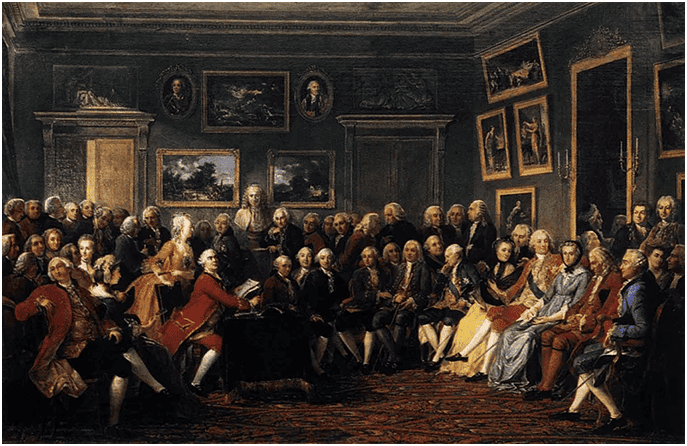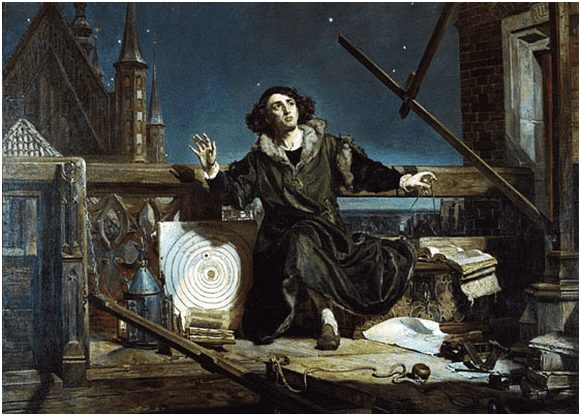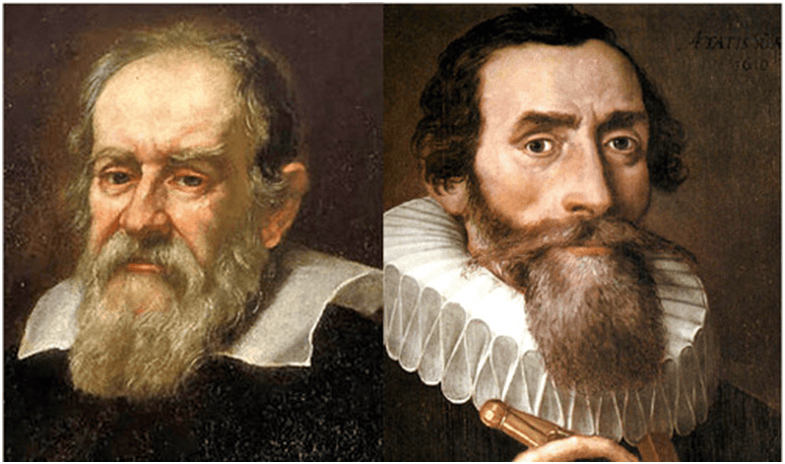UPSC Exam > UPSC Notes > History Optional for UPSC > Enlightenment & Roots of Enlightenment
Enlightenment & Roots of Enlightenment | History Optional for UPSC PDF Download
| Table of contents |

|
| What is Enlightenment |

|
| Background/Roots of Enlightenment |

|
| The Scientific Revolution |

|
| Galileo and Kepler |

|
| The Declining Influence of the Church |

|
What is Enlightenment
- Enlightenment was an intellectual, philosophical, cultural, and social movement that spread throughout Europe, primarily in the Western part, during the 17th and 18th centuries. This era is often referred to as the Age of Enlightenment or the Age of Reason.
- It marked a significant departure from the Middle Ages in Europe, characterized by a shift in thought and perspective.

Fundamental Features of Enlightenment
- Reason/Rationalism: The Enlightenment period glorified human reason, emphasizing the belief that through reason, individuals could discover truths, natural laws governing existence, and contribute to human progress. It encouraged people to look beyond traditions and conventions, advocating for the power of individual reasoning in making decisions.
- Naturalism/Natural Law: Enlightenment thinkers promoted a scientific approach as a replacement for supernatural theological explanations. They believed in the discovery of natural laws, akin to Newton's principles, that govern the universe. The universe was viewed as a complex machine, and understanding its fundamental laws would enable its proper functioning.
- Optimism of Human Progress: The era was characterized by a strong belief in the potential for continuous improvement and the eventual perfection of mankind through increased use of reason and a broader understanding of natural laws.
- Humanism: Humanism during the Enlightenment focused on human well-being, welfare, liberty, and dignity. It rejected any institutions or ideas that constrained human freedom, challenging the authority of deeply rooted institutions like the Catholic Church.
- Individualism: Individualism emphasized the importance of the individual and their inherent rights.
- Relativism: Relativism during the Enlightenment promoted the idea that different cultures, beliefs, and value systems held equal merit.
- Reformative Ideas
Enlightenment ideas were reformative in various fields
- Economy: Ideas by thinkers like Adam Smith.
- Law: Concepts proposed by Jeremy Bentham.
- Ethics: Philosophies put forth by Emmanuel Kant.
- Religion: Views expressed by Voltaire.
- Society: Thoughts by Jean-Jacques Rousseau.
Struggles of Ideas
During the Enlightenment, there was a struggle between various ideas, such as:
- Liberty versus despotism
- Protestantism versus Catholicism
- Authority versus reason
Background/Roots of Enlightenment
- The Middle Ages were marked by strong religious devotion and severe cruelty.
- During this time, the Church held significant power, especially within the Holy Roman Empire.
- Efforts like the Crusades were partly aimed at finding and punishing heretics, which eventually led to a desire for change among Europeans.
- Science was often seen as heretical, and those who attempted to explain miracles through scientific means faced severe consequences.
- Society was very hierarchical, with widespread practices like serfdom.
- There were no guarantees of personal freedoms or rights, and many Europeans lived in fear of religion, either from a vengeful God or the sometimes harsh Church.
- British philosopher John Locke is considered an important precursor to the Enlightenment, and his ideas will be explored in more detail later.
Question for Enlightenment & Roots of EnlightenmentTry yourself: What was one of the fundamental features of the Enlightenment period?View Solution
The Scientific Revolution

- The Enlightenment emerged from a wide range of cultural and intellectual shifts in Europe during the 16th and 17th centuries.
- One of the key changes during this period was the Scientific Revolution.
- The Scientific Revolution paved the way for independent thinking, leading to significant updates and expansions in fields such as mathematics, astronomy, physics, politics, economics, philosophy, and medicine.
- The volume of new knowledge that came to light was astonishing. Equally important was the enthusiasm with which people embraced the Enlightenment: intellectual gatherings flourished in France, philosophical debates took place, and the increasingly literate population avidly read and shared books.
- During the Scientific Revolution, European thinkers dismantled the incorrect set of “scientific” beliefs upheld by ancient authorities and the Church.
- In place of this flawed knowledge, scientists aimed to uncover and communicate the true laws governing the natural phenomena they observed.
- Ironically, the Church initially supported scientific inquiries, believing that studying the world was a form of piety and a way to appreciate God’s creations.
Galileo and Kepler

- The Church’s supportive attitude towards science shifted dramatically when astronomers like Galileo Galilei (1564–1642) and Johannes Kepler (1571–1630) began to challenge established beliefs.
- Galileo, in particular, faced significant opposition from the Church for endorsing the theories of Polish astronomer Copernicus, who proposed that the sun, not the earth, was the center of the solar system. This idea contradicted the Church’s long-held teaching that the earth was at the center.
Bacon and Descartes
- Galileo had long said that observation was a necessary element of the scientific method—a point that Francis Bacon (1561-1626) solidified with his inductive method which stresses observation and reasoning as the means for coming to general conclusions.
- Rene Descartes(1596-1650) talents ran the gamut from mathematics to philosophy.
- He came to the philosophical conclusion “I think, therefore I am”—asserting that, if nothing else, he was at least a thinking being.
- Descartes’deductive approach to philosophy, using math and logic, stressed a “clear and distinct foundation for thought”.
Newton (1642–1727)
- Newton had also prepared ground for Enlightenment through his findings of natural laws.
- He revealed a number of natural laws that had previously been credited to divine forces.
- He worked in areas of mathematics,physics(for e.g.gravity),optics etc.
Exploration and Imperialism
- Change was taking place in Europe as the result of exploration and the extension of overseas empires in the Americas,Africa and Asia.
- European explorers used new transportation technologies to explore new areas.
- As these explorers returned from across the world with stories of peoples and cultures never previously known, Europeans were introduced to drastically different lifestyles and beliefs.
- The worldlier perspective provided Enlightenment-era thinkers with the inspiration and impetus for change.
Question for Enlightenment & Roots of EnlightenmentTry yourself: Which scientist proposed the theory that the sun, not the earth, was the center of the solar system, challenging the established beliefs of the Church?View Solution
The Declining Influence of the Church
- Yet another major change in the lives of Europeans prior to the Enlightenment was the weakening of adherence to traditional religious authority.
- The questioning of religion itself can largely be traced to the tensions created by the Protestant Reformation, which split the Catholic Church and opened new territory for theological debate.
- As other seventeenth century thinkers similarly questioned the authority of organized religion, it became much more common in European intellectual circles to put the concepts of religious belief to question.
- This combined with the new discoveries of the Scientific Revolution threatened the supremacy of Church doctrine considerably.
- Moreover, these advances in thought coincided with anti-church and government sentiment that was already growing among European commoners.
- The Catholic Church at the time was famously corrupt, and it often ruled using intimidation,fear, and false knowledge and was violently intolerant toward dissenters and heretics.
- Subsequently, when Enlightenment philosophers came along praising liberty and self-empowerment, people found willing ears.
Anti-War Sentiments
- Before the Enlightenment in Europe, there was a growing skepticism about the fairness of absolute monarchy.
- Events such as wars weakened the authority of the European divine right, which held that monarchs were infallible because their power came from God.
- The suffering experienced by the German public during the Thirty Years' War(1618-1648) prompted influential European thinkers and writers to criticize war as a social institution.
Czech Reformer John Comenius (1592-1670)
- Comenius questioned the necessity of war.
- He highlighted the commonality among all humans by stating, “We are all citizens of one world, we are all of one blood.”
- His views challenged the notion of nationalism and the expectation that individuals should sacrifice their lives for their country.
Dutch Thinker Hugo Grotius (1583-1645)
- Grotius argued that an individual’s right to live in peace is more important than any national duty imposed by a government.
- In his work On the Law of War and Peace(1625), he advocated for humane treatment during wartime and suggested policies such as:
- Declaration of War
- Honoring Treaties
- Humane Treatment of War Prisoners
Comenius and Grotius: Pioneers of Anti-War Sentiments
- The anti-war perspectives of Comenius and Grotius marked the early stages of the Enlightenment by challenging traditional views and adopting a humanistic approach to the atrocities caused by war.
The document Enlightenment & Roots of Enlightenment | History Optional for UPSC is a part of the UPSC Course History Optional for UPSC.
All you need of UPSC at this link: UPSC
|
367 videos|995 docs
|
FAQs on Enlightenment & Roots of Enlightenment - History Optional for UPSC
| 1. What were the main ideas and principles of the Enlightenment? |  |
Ans.The Enlightenment, also known as the Age of Reason, emphasized reason, individualism, and skepticism of traditional authority. Key ideas included the belief in human progress, the importance of scientific inquiry, the advocacy for civil liberties, and the promotion of secularism. Thinkers like John Locke, Voltaire, and Rousseau championed these principles, arguing for the rights of individuals and the role of reason in understanding the world.
| 2. How did the Enlightenment influence modern political thought? |  |
Ans.The Enlightenment profoundly influenced modern political thought by promoting ideas such as democracy, the separation of powers, and the social contract. Philosophers like Montesquieu and Rousseau laid the groundwork for democratic governance, arguing that political power should derive from the consent of the governed. This shift in thinking contributed to revolutions and the development of constitutional governments in the 18th and 19th centuries.
| 3. What role did the Enlightenment play in the advancement of science and education? |  |
Ans.The Enlightenment played a crucial role in advancing science and education by encouraging empirical research and the scientific method. Thinkers like Isaac Newton and Francis Bacon emphasized observation and experimentation, leading to significant scientific discoveries. Additionally, the period saw the establishment of universities and the spread of literacy, making education more accessible, which fostered critical thinking and public discourse.
| 4. Who were some key figures of the Enlightenment, and what were their contributions? |  |
Ans.Key figures of the Enlightenment included John Locke, who advocated for natural rights and government by consent; Voltaire, known for his writings on freedom of speech and religion; Jean-Jacques Rousseau, who explored the social contract and the idea of the general will; and Immanuel Kant, who emphasized reason and autonomy in moral philosophy. Their contributions laid the foundation for modern democratic and ethical thought.
| 5. What were the criticisms of the Enlightenment, and how did they shape subsequent thought? |  |
Ans.Criticisms of the Enlightenment arose from various perspectives, including Romanticism, which argued that it overemphasized reason at the expense of emotion and individuality. Others contended that Enlightenment thinkers often excluded marginalized groups and perpetuated colonialism. These critiques led to the development of post-Enlightenment thought, which sought to address issues of inequality and the limitations of reason, influencing later movements like feminism and postmodernism.
Related Searches















